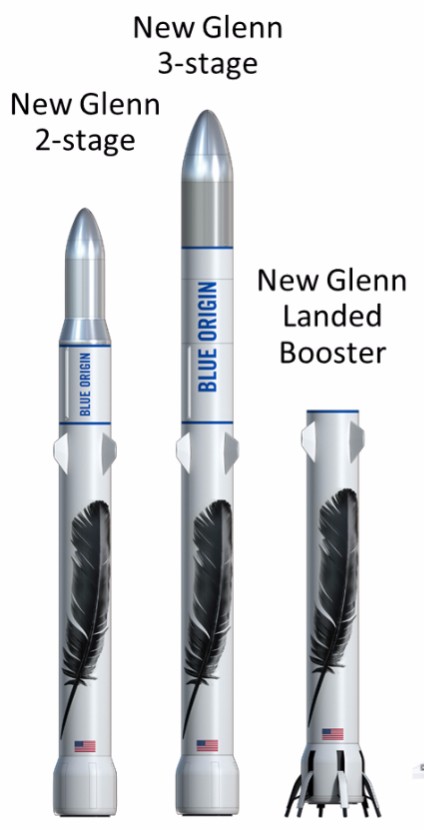Image: Blue Origin
The news spread yesterday like wildfire: Jeff Bezos has announced in an e-mail that his suborbital spaceflight company, Blue Origin, has a roadmap for going orbital.

The new generation of rockets will build upon the successes of the suborbital New Shepard rockets the company has been testing for the past two years, and will be named the New Glenn series. The first stage will be a reusable booster powered by seven BE-4 methane-oxygen rocket engines — the same rockets the company is developing as a potential replacement for the Russian RD-180 engines in United Launch Alliance’s next-generation rocket, the Vulcan. The second stage will use a single BE-4 retooled for use in a vacuum, and the optional third stage will be powered by the BE-3U, a vacuum-optimized version of the hydrogen-oxygen engine that currently works just fine on the New Shepard series rockets.
But what about power? The graphic you’re going to see a lot of is the one at the top of this post, with the three New Glenns nestled in between a Delta IV Heavy and a Saturn V. One could thus be forgiven for having the impression that both the Delta IV Heavy and New Glenn rockets are more powerful than the SpaceX Falcon Heavy which sits off to the left, but in this supposition one would be wrong.
The Delta IV Heavy produces 2,130,000 lb-ft of thrust at sea level, and can deliver 63,470 lbs of payload to Low Earth Orbit. The New Glenn 3-stage will produce 3,850,000 lb-feet of thrust at sea level but its LEO payload capacity is as-yet undescribed. The Falcon Heavy will produce 5,130,000 lb-ft at sea level, and take 119,900 lbs to LEO.
That sounds like the Falcon Heavy wins hands-down, but bear in mind that the New Glenn is going to produce that thrust with a single core, while the Falcon Heavy will be using three. Also bear in mind that SpaceX’s Mars Colonial Transport’s “BFR” launcher is also coming, and with all the real-world experience the company has racked up, it might well fly before Blue Origin can get a single New Glenn off the ground — the engine for it, the Raptor, may already be ahead of the BE-4 in development terms.
So this is all to say that if I were Elon Musk, I wouldn’t be too concerned just yet. Blue Origin still has a long way to go to be a direct competitor for SpaceX. But Bezos does seem to have finally put his foot on the gas, and might just be visible in the rear-view mirror of Musk’s self-driving Tesla, so here’s hoping they can sort out that recent “fast fire” issue soon and get back on track.
In the meantime — we’re going to have two independent, private, non-ULA rocketry companies in the US! How cool is that?
***
Thanks for reading! Except for the very *very* occasional tip (we take Venmo now!), I only get paid in my own (and your) enthusiasm, so please like This Week In Tomorrow on Facebook, follow me on Twitter @TWITomorrow, and tell your friends about the site!
If you like our posts and want to support our site, please share it with others, on Facebook, Twitter, Reddit — anywhere you think people might want to read what we’ve written. Thanks so much for reading, and have a great week.
***
Richard Ford Burley is a human, writer, and doctoral candidate at Boston College, as well as an editor at Ledger, the first academic journal devoted to Bitcoin and other cryptocurrencies. In his spare time he writes about science, skepticism, feminism, and futurism here at This Week In Tomorrow.

